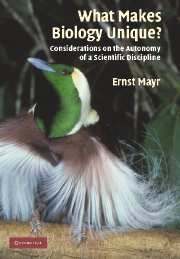Book contents
- Frontmatter
- Contents
- Preface
- Acknowledgments
- Introduction
- 1 Science and sciences
- 2 The autonomy of biology
- 3 Teleology
- 4 Analysis or reductionism?
- 5 Darwin's influence on modern thought
- 6 Darwin's five theories of evolution
- 7 Maturation of Darwinism
- 8 Selection
- 9 Do Thomas Kuhn's scientific revolutions take place?
- 10 Another look at the species problem
- 11 The origin of humans
- 12 Are we alone in this vast universe?
- Glossary
- Index
- References
1 - Science and sciences
Published online by Cambridge University Press: 10 December 2009
- Frontmatter
- Contents
- Preface
- Acknowledgments
- Introduction
- 1 Science and sciences
- 2 The autonomy of biology
- 3 Teleology
- 4 Analysis or reductionism?
- 5 Darwin's influence on modern thought
- 6 Darwin's five theories of evolution
- 7 Maturation of Darwinism
- 8 Selection
- 9 Do Thomas Kuhn's scientific revolutions take place?
- 10 Another look at the species problem
- 11 The origin of humans
- 12 Are we alone in this vast universe?
- Glossary
- Index
- References
Summary
Biology is a science; there is no argument about this statement, or is there? Doubts about this claim have been suggested by important differences among various widely accepted definitions of science. A comprehensive, pragmatic definition of science might be “Science is the human endeavor to achieve a better understanding of the world by observation, comparison, experiment, analysis, synthesis, and conceptualization.” Another definition might be “Science is a body of facts (‘knowledge’) and the concepts that permit explaining these facts,” and there are numerous others. In a recent book (Mayr 1997:24–44) I have devoted a twenty-page chapter to a discussion of the question, “What is science?”
Difficulties arise because the term science also has been used for so many human activities beyond the natural sciences, such as the social sciences, political science, military science, and more distant areas such as Marxist science, Western science, feminist science, and even Christian Science and Creationist Science. In all these combinations, the word science is used in a misleadingly inclusive sense. Equally misleading, however, is the opposite extreme, the decision of some physicists and physicalist philosophers to restrict the word science to mathematically based physics. A vast literature shows how difficult, indeed impossible, it seems to be to draw a line between incontrovertible science and adjacent fields. This diversity is a heritage of history.
One can claim that science originated in preliterary times when people began to ask “how?” and “why?” questions about the world.
- Type
- Chapter
- Information
- What Makes Biology Unique?Considerations on the Autonomy of a Scientific Discipline, pp. 11 - 20Publisher: Cambridge University PressPrint publication year: 2004

